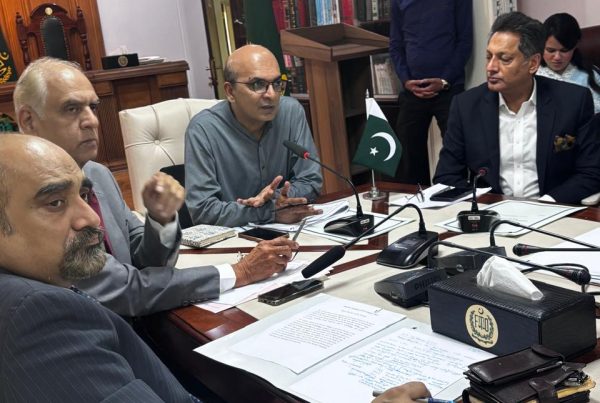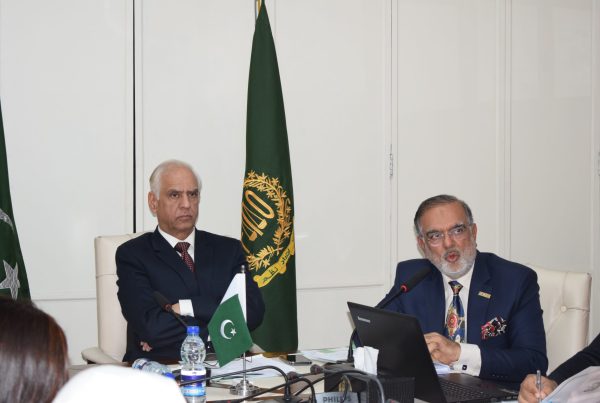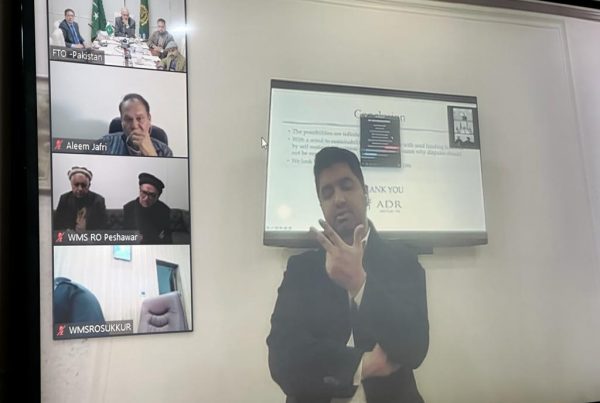The OIC Ombudsman Association (OICOA) Secretariat in collaboration with the Forum of Pakistan Ombudsman (FPO) hosted a training session titled “Conducting Effective Research in an Ombudsman Office.” The event was held at the OICOA Secretariat in Islamabad, Pakistan, and was offered to its member institutions via Zoom. This session was led by Dr. Mian Waheeduddin, the Research Head of OICOA Member Institute, Office of the Provincial Ombudsman of Punjab, Pakistan.
The primary objective of this training session was to enhance the research capabilities of personnel working within the Ombudsman offices. The session aimed to provide participants with advanced research techniques, methodologies, and best practices essential for investigating complaints, formulating recommendations, and ensuring accountability and transparency within governmental and administrative processes.
Dr. Mian Waheeduddin, an expert in administrative research with extensive experience in conducting public-sector research studies, led the training session. His vast knowledge and practical experience provided valuable insights into the intricacies of conducting thorough and effective research within an Ombudsman office.

Dr. Waheeduddin emphasized the critical role research plays in the Ombudsman’s office, particularly in resolving complaints, identifying systemic issues, and making policy recommendations. He highlighted the importance of evidence-based decision-making and how meticulous research underpins the credibility and effectiveness of the Ombudsman’s findings.
The session covered various qualitative and quantitative research methodologies suitable for Ombudsman investigations. Participants were introduced to advanced research tools and technologies that can aid in data collection, analysis, and reporting. The use of these tools was demonstrated through practical examples, allowing participants to understand their application in real-world scenarios.
Several case studies from the Provincial Ombudsman Office of Punjab were presented, showcasing how effective research led to a successful resolution of complaints and policy changes. Interactive group activities allowed participants to apply the discussed methodologies to hypothetical scenarios, enhancing their practical understanding.
A critical aspect of the training was managing data with utmost confidentiality and integrity. Dr. Waheeduddin provided guidelines on ethical considerations, data protection laws, and best practices for handling sensitive information. This segment was particularly crucial in ensuring that participants are well-versed in maintaining the trust and confidentiality expected in Ombudsman investigations.
The session also included a segment on structuring and writing comprehensive research reports. Participants learned how to present their findings clearly and concisely, ensuring their reports are accessible and actionable for policymakers and other stakeholders. Emphasis was placed on the clarity of communication and the importance of making recommendations that are backed by solid evidence.
The training session received overwhelmingly positive feedback from the participants. Many appreciated the practical approach and the relevance of the content to their daily work. The interactive elements, particularly the case studies and group activities, were highlighted as particularly beneficial for understanding real-world applications of the methodologies discussed.
Key outcomes of the session included, improved understanding of advanced research methodologies and tools, increased awareness of ethical considerations in research, and better preparedness for managing and analyzing data effectively.
The training session on “Conducting Effective Research in an Ombudsman Office” conducted by OICOA in collaboration with the Forum of Pakistan Ombudsman was a significant step towards strengthening the research capabilities of OICOA Member Institutions. Under the expert guidance of Dr. Mian Waheeduddin, participants gained valuable insights and practical skills that will undoubtedly contribute to more effective and efficient resolution of complaints, ultimately enhancing public trust in the Ombudsman institutions.
By actively participating in such training sessions, the member institutions of OICOA demonstrate their commitment to continuous improvement and excellence in public service, ensuring they remain robust mechanisms for accountability and justice.






